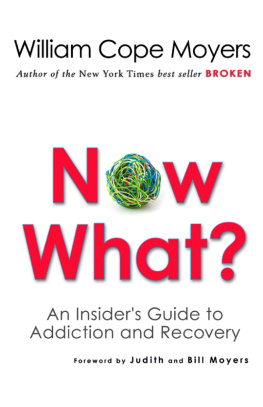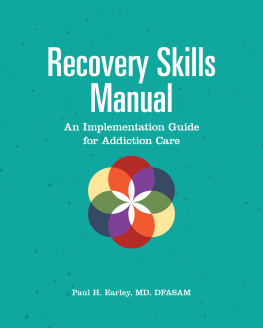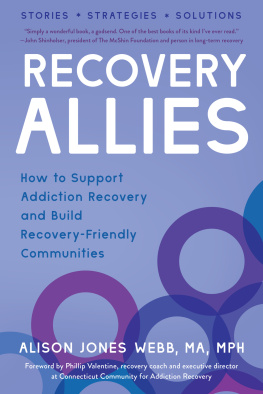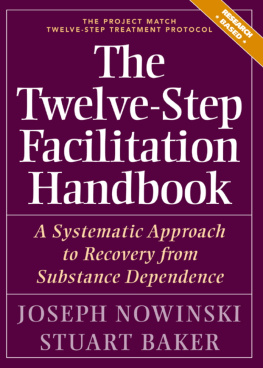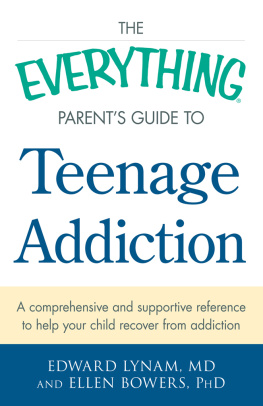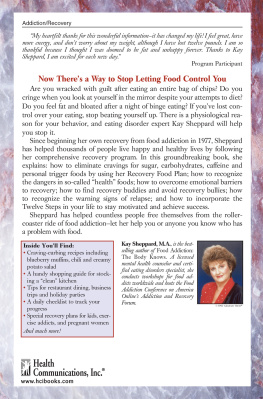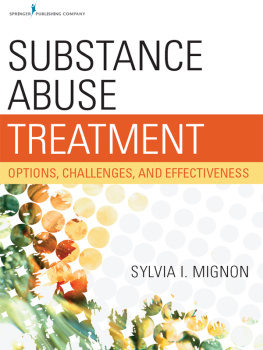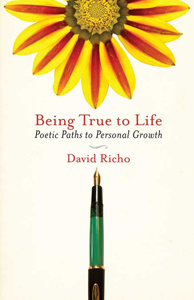Praise for Recovery Options: The Complete Guide
Finally! A no-nonsense, state-of-the-art guide that one can hand to anybody who is having trouble with drugs, alcohol, tobacco, or foods of various kinds. What a gift Volpicelli and Szalavitz have given us: A stupendous, practical way to help the colleagues and loved ones in our lives who are struggling with chemical dependency.
Laurie Garrett, author of The Coming Plague:
Newly Emerging Diseases in a World Out of Balance
Comprehensive, illuminating, easy to read... this book points out the diverse paths to the ultimate goalrecovery from alcohol and other drug abuse.
William Cope Moyers,
Vice President of Public Affairs, Hazelden Foundation
At last a sensible, clear guide for consumers who are facing the tough choice of seeking treatment for addictive behaviors. In a field long driven by emotion and minimal scientific evidence, Volpicelli and Szalavitz impartially review the options and explain them in clear language. In addition, they take some of the hysteria out of the issues facing substance users and their loved ones by providing a coherent summary of what we really know about alcohol and other drugs. A must read. Bravo!
Fred Rotgers, Assistant Chief Psychologist,
Smithers Addiction Treatment and Training Center
Wise, accurate, responsible, accessible, well written. Im assigning it for my course in drug policy.
Mark Kleiman, Professor of Policy Studies at UCLA
and author of Against Excess: Drug Policy for Results
Joe Volpicelli is one of the most creative research scientists and clinicians in the addiction field. With Maia Szalavitz, he has put together a highly practical and effective book describing a modern approach to the treatment of alcoholism and other addictive disorders. This approach is steeped in pragmatism and soundly based on science. It utilizes techniques that work and that have been adapted to the needs of individual patients. The writing is clear, succinct, and understandable. It should be a very useful guide for patients, their families, and professionals in addressing this terrible disease.
Charles P. OBrien, M.D., Ph.D., Kenneth Appel Professor,
Department of Psychiatry, VA Medical Center; President,
American College of Neuropsychopharmacology
Recovery Options:
The Complete Guide
Joseph Volpicelli, M.D., Ph.D.
Maia Szalavitz

Copyright 2000 by Joseph Volpicelli and Maia Szalavitz. All rights reserved.
Published by John Wiley & Sons, Inc.
Published simultaneously in Canada.
No part of this publication may be reproduced, stored in a retrieval system or transmitted in any form or by any means, electronic, mechanical, photocopying, recording, scanning, or otherwise, except as permitted under Sections 107 or 108 of the 1976 United States Copyright Act, without either the prior written permission of the Publisher, or authorization through payment of the appropriate per-copy fee to the Copyright Clearance Center, 222 Rosewood Drive, Danvers, MA 01923, (978) 750-8400, fax (978) 750-4744. Requests to the Publisher for permission should be addressed to the Permissions Department, John Wiley & Sons, Inc., 605 Third Avenue, New York, NY 10158-0012, (212) 850-6011, fax (212) 850-6008, E-Mail: PERMREQ@WILEY.COM.
The information contained in this book is not intended to serve as a replacement for professional medical advice. Any use of the information in this book is at the readers discretion. The author and the publisher specifically disclaim any and all liability arising directly or indirectly from the use or application of any information contained in this book. A health-care professional should be consulted regarding your specific situation.
Library of Congress Cataloging-in-Publication Data
Volpicelli, Joseph.
Recovery options: the complete guide / Joseph Volpicelli, Maia Szalavitz.
p. cm.
Published simultaneously in Canada.
Includes index.
ISBN 0-471-34575-X (paper)
1. Alcoholism. 2. AlcoholismTreatment. I. Szalavitz, Maia. II. Title.
RC565.V63 2000
616.86' 1dc21 99-054733
Printed in the United States of America
10 9 8 7 6
To my patients
Joe
To Peter
Maia
Contents
Preface
My (Maias) road to addiction is my own. There are countless routes to this destination, and, often, how you get in has a bearing on the best way out. Because there are so many ways to get hooked, there need to be many ways to get free. I hope that this book will give people with alcohol and other drug problems and their loved ones a sense of what addiction is and how best to treat it. I hope also to show how its crucial to recognize the differences among people with substance problems, as well as the similarities. When I attended treatment, the one-size-fits-all philosophy guided care, and I was lucky to get what I needed. Many other people arentbut this book can help you increase the odds.
I also hope this book can decrease your fears about treatment. I avoided treatment for years because I had heard about how humiliating some types of addiction care are. I didnt want to be broken downfeeling broken was why Id used drugs in the first place. I didnt know there were choices. I didnt know what to expect. If I had, I probably would have sought help sooner. This book can demystify the various treatment experiences so that you can find the type that will be most helpful.
I wasnt supposed to become a cocaine and heroin addict. My eighth-grade class voted me Most Likely to Succeed, and in high school, I was known as Mass Media Maia because of my obsession with producing the schools cable-TV news show. I wrote for Seventeen magazine. My grades and test scores won me admission to Columbia University.
All that early promise didnt make me happy, though. My overweening ambition was a geeky attempt to win friends by offering the promise of future favors. I couldnt imagine that anyone would like me for myself.
Drug education had taught me that tobacco was truly deadly, so I avoided it, and I didnt like the way alcohol seemed to lessen my self-control. As a geek, however, when drug-prevention teachers said that peer pressure will make you take drugs, they were essentially telling me, drugs are cool. I didnt want to be an outcast, so I felt Id have to give in to peer pressure on at least one substance. Marijuana and psychedelics began to fascinate me. As soon as I could find a source, I began smoking pot.
Pot and psychedelics caused me few problems. I continued to do well in school in fact, my social life improved radically. My drug use didnt cause symptoms, it alleviated them at first.
When I was 17, however, my boyfriend turned me on to cocaine. By the time I started college, I was well on my way to becoming a cocaine addict. The prep-school kids with their perfect clothes and their trust funds intimidated me. I felt as though I always had toilet paper or worse on the bottom of my shoelike a walking faux pas. I started selling coke so I could make friends by having something they wanted.
Again, it worked at first. Soon I was part of the in crowd who could get behind the velvet ropes at the hottest 1980s night clubs. I began selling coke to celebrities. But then the late nights started to take a toll on my grades, and the college started to get suspicious about why so many people were visiting my dorm.
At the end of my sophomore year, I was suspended for dealing drugs. I should have been grateful that Columbia hadnt called the police or expelled me instead, I thought my life was over because I had ruined my academic record.
Next page

